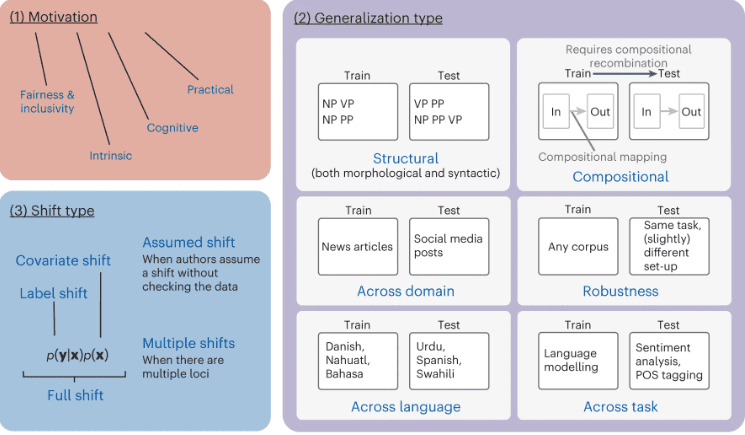TL;DR:
- GenBench, introduced by Meta AI researchers, addresses NLP generalization challenges.
- NLP models must be generalized effectively for applications like sentiment analysis and chatbots.
- GenBench’s taxonomy includes five critical dimensions for classifying NLP generalization research.
- It aims to set a new standard for NLP research, enhancing model evaluation and development.
- GenBench empowers researchers, identifies knowledge gaps, and advances NLP understanding.
Main AI News:
In the ever-evolving landscape of Natural Language Processing (NLP), the ability of models to effectively generalize their learned knowledge to diverse contexts is paramount. While the importance of generalization in NLP is widely acknowledged, the precise criteria for defining a robust generalization and the methods to assess it have remained elusive. Generalization empowers models to adapt and interpret information contextually, a critical requirement for applications like sentiment analysis, chatbots, and translation services, which demand versatility across various scenarios.
Exceptional generalization, however, extends beyond mere rote memorization of training data; it entails applying learned knowledge to real-world scenarios with uniqueness. Recognizing this imperative, a cadre of researchers at Meta has introduced a comprehensive taxonomy designed to elucidate and demystify NLP generalization research. Their groundbreaking initiative, known as GenBench, endeavors to address these challenges while providing a systematic framework for studying generalization in NLP.
GenBench’s taxonomy comprises five distinct axes, each serving as a pivotal dimension for categorizing and delineating the myriad facets of NLP generalization research:
- Main Motivation: Research studies are classified along this axis based on their primary objectives or driving forces. Different investigations may be motivated by varied goals, such as robustness, performance enhancement, or achieving human-like behavior.
- Type of Generalization: Study types are categorized according to the specific kind of generalization they aim to tackle. This could encompass issues related to topic shifts, transitions in genre, or adaptability to different domains.
- Type of Data Shift: Along this axis, studies are classified based on the type of data shift they focus on. Data shifts can manifest in multiple forms, including variations in topic, genre, or domain.
- Source of Data Shift: Identifying the origins of data shifts is crucial. These shifts can emanate from variances in data processing techniques, labeling methods, or data collection procedures.
- Locus of Data Shift in NLP Modelling Pipeline: This dimension determines the point in the NLP modeling process where data shifts occur. It could manifest within the model’s architecture, during preprocessing, or even at the input stage.
GenBench’s arsenal includes a generalization taxonomy, a comprehensive meta-analysis comprising 543 research papers on NLP generalization, an array of online tools tailored for researchers, and GenBench evaluation cards. The overarching aim is to establish state-of-the-art generalization testing as the new gold standard in NLP research, thereby facilitating more robust model evaluation and development.
The insights derived from the taxonomy classification not only serve scholarly pursuits but also offer valuable guidance for future investigations. By identifying gaps in our understanding of generalization in natural language processing, this taxonomy empowers researchers to push the boundaries of knowledge and advance the field. GenBench, with its meticulous approach and innovative tools, is poised to usher in a new era of excellence in NLP research, where the potential of models is fully realized through precise and effective generalization.
Conclusion:
The introduction of GenBench signifies a pivotal moment for the NLP market. With a systematic approach to generalization, it promises to elevate the capabilities of NLP models, making them more adaptable and versatile. This advancement will have far-reaching implications, enhancing the performance and reliability of NLP applications in diverse industries, from customer service chatbots to content translation services. As the field of NLP continues to evolve, GenBench sets the stage for more effective and impactful natural language processing technologies.

